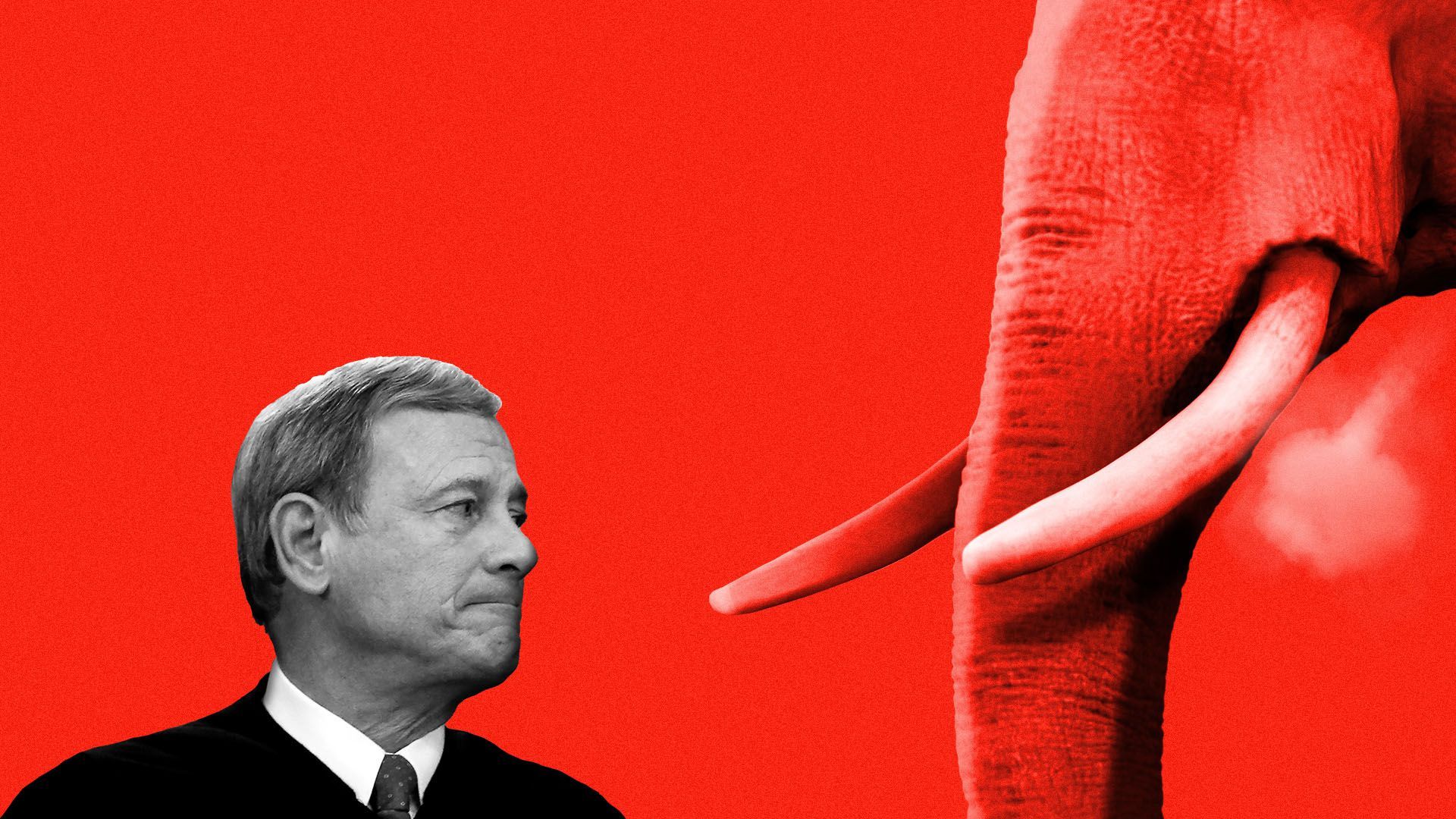The right v. John Roberts
Add Axios as your preferred source to
see more of our stories on Google.

Illustration: Sarah Grillo/Axios
Conservatives are frustrated with Supreme Court Chief Justice John Roberts after a pair of surprising rulings last week — and those frustrations are only likely to grow.
Driving the news: The court is set to rule in the next week or two on abortion, federal bank regulations and President Trump’s taxes, and none of those cases are primed for sweeping conservative victories.
Last week, Roberts voted with the court’s liberals in a 5-4 ruling blocking Trump’s moves to end the immigration program known as DACA. Roberts, along with Justice Neil Gorsuch, also joined the court’s liberals to rule that federal law protects LGBTQ workers from employment discrimination.
- Both of those rulings upset conservative legal activists, many of whom already question Roberts’ commitment to their cause, following surprising or narrow rulings in high-profile cases, most notably his 2012 decision to uphold the Affordable Care Act.
- “His critics expected him to be more conservative, or more reliable or more steadfast,” says Jonathan Adler, a prominent conservative legal expert and a professor at Case Western Reserve University.
Those activists probably won’t be getting any happier over the next week or so, as the court finished up its term.
Abortion: The court is set to rule any day now on a challenge to Louisiana’s abortion restrictions, which require providers to have admitting privileges at a nearby hospital.
- Louisiana’s law is almost identical to a Texas law the court struck down in 2016. Most legal experts expect the court to simply adhere to precedent and strike down Louisiana’s law, too.
- Such a ruling wouldn’t change abortion law. It would leave the status quo in place and would only signal that the court isn’t likely to make a sudden, dramatic shift, even if it’s still inclined to eventually chip away at Roe v. Wade.
- That’s been the expectation for a long time, but with a stronger conservative majority thanks to Trump’s nominees, a big, dramatic shift is what many advocates want to see.
Then there’s a challenge to the structure of the Consumer Financial Protection Bureau — the financial watchdog conceived by Elizabeth Warren and established in the wake of the 2008 crash.
- If the court wants to swing for the fences, the case gives the court an opening to strike down the entire CFPB, or even the entire Dodd-Frank law.
- But the more likely outcome is a narrow ruling saying the president must be able to fire the CFPB director.
Biggest of all are the two cases over efforts to investigate Trump’s financial records.
- Oral arguments in those cases suggested some kind of split decision, but that Trump is highly unlikely to get what he wants — a sweeping ruling that says the president can never be investigated, by anyone.
- Based on oral arguments, the court seemed inclined to rule that Trump’s financial institutions have to comply with subpoenas from Manhattan prosecutor Cy Vance. Subpoenas from the House are on shakier ground.
Key caveat: These are educated guesses about how the court is likely to rule, but these predictions are notoriously difficult.
- The DACA and LGBTQ discrimination rulings were both, in addition to being wins for liberals, surprises. It’s entirely possible the conservatives will pull out some surprising wins in the remaining cases, too.
But based on the tea leaves available for reading, these cases all seem like prime candidates for the incremental, long-view approach Roberts often adopts in big cases, to the frustration of so much of the right.
- An abortion ruling simply adhering to precedent, much like a narrow ruling that the president is not above investigation, would not be groundbreaking or even, necessarily, particularly ideological. They would be small-c conservative, consistent with Roberts’ concern for the court’s place in the political process.
Some of Roberts’ conservative critics believe he’s turning into a liberal. Others say he’s too susceptible to political and cultural pressures that fall outside of legal interpretation. A more charitable explanation — one Adler has advanced — is that Roberts likes to rock the boat as little as possible in high-profile cases.
- “When the implications of siding a particular way result in large programs with large numbers of people being affected, he's a much harder vote to get,” Adler said. “I do think there’s a consistency there.”
